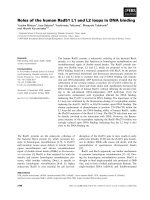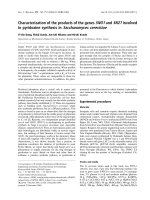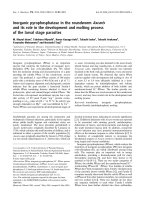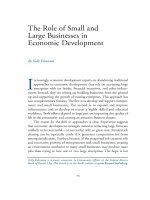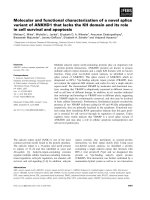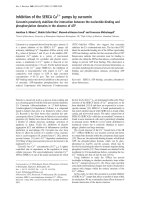The Labour Party and Taxation Party Identity and Political Purpose in Twentieth-Century Britain doc
Bạn đang xem bản rút gọn của tài liệu. Xem và tải ngay bản đầy đủ của tài liệu tại đây (1.24 MB, 308 trang )
This page intentionally left blank
The Labour Party and Taxation
Party Identity and Political Purpose in
Twentieth-Century Britain
This is a political history of Labour's use of the tax system from
1906 to 1979: an epilogue br
ings the story up to the presen
t,
surveying New Labour's tax policies and dilemmas. Richard
Whiting's broad-ranging, lucid and readable study examines
how Labour used tax to further its political aims of funding
welfare, managing the economy, promoting fairness and
achieving greater equality. Whiting also shows the limits of
Labour's ability to achieve a more equal society in this way,
assesses the ability and standing of key ®gures in the labour
movement, and delineates the problems caused by the political
role of the trade unions. This study provides an original
perspective on Labour's history, and is a valuable contribution
to understanding both the tax structure and the politics of
twentieth-century Britain more generally.
RICHARD WHITING is a senior lecturer in modern history at
Leeds University. His earlier publications include The Bound-
aries of the State in Modern Britain (with S. J. D. Green, 1996),
Oxford: Studies in the History of a University Town since 1800
(1993) and The View from Cowley. The Impact of Industrialization
on Oxford, 1918±1939 (1983).
The Labour Party and Taxation
Party Identity and Political Purpose in
Twentieth-Century Britain
Richard Whiting
University of Leeds
The Pitt Building, Trumpington Street, Cambridge, United Kingdom
The Edinburgh Building, Cambridge CB2 2RU, UK
40 West 20th Street, New York, NY 10011-4211, USA
477 Williamstown Road, Port Melbourne, VIC 3207, Australia
Ruiz de Alarcón 13, 28014 Madrid, Spain
Dock House, The Waterfront, Cape Town 8001, South Africa
First published in printed format
ISBN 0-521-57160-X hardback
ISBN 0-511-03843-7 eBook
Richard Whitin
g
2004
2001
(Adobe Reader)
©
For Betsey
Contents
Listoftablespageix
Acknowledgementsx
Listofabbreviationsxiii
Introduction:Taxationandpoliticaldebate1
1Struggleswithinaliberalinheritance,1906±19408
LabourandLiberalsbefore191410
Theimpactofwaronthetaxenvironment16
Thenationaldebt,expertopinionandLabour'staxstrategy23
Thesurtax,socialspendingandpartydivisions34
Snowdenandthemiddleclasses42
Keynes,Labourandtheonsetofwar50
The`culture'oftaxpolitics52
2Thechangingbalanceoftaxinterests,1940±195461
Therich67
Taxationandindustry83
Thepeople90
Taxationandtheparty105
TheConservativeresponse111
Takingstock122
3TheKaldorera,1951±1965130
Taxissuesofthe1950s132
Labour'spolicy-makinginopposition143
Socialismandtaxation148
TheimpactoftheConservatives153
The1965budget159
Assessment168
4Socialdemocracyexamined,1965±1970173
Economicandsocialpolicyanalyses174
Redistribution179
Taxreform195
Localgovernment®nance205
Economicmanagementandtaxadministration208
vii
5Defensivepositions,1970±1979214
Opposition,1970±1974217
Democracyandtaxpolicy,1974±1979232
Publicexpenditure,taxationandthetradeunionpresence246
Change256
6Epilogue:NewLabour,oldproblems?259
7Conclusion269
Selectbibliography274
Index287
viii Contents
Tables
1 Increases in the rates of certain direct personal taxes,
1913/1914±1919/1920
page 19
2 Indices of ta x receipts and nominal national income,
1949±1964
133
3 Income after all taxes and bene®ts as a percentage of
original income for 1965 and 1970 for the poor, unskilled
manual and skilled manual workers, and professional and
administrative employees
185
4 Income tax threshold for a married man with two children,
as a percentage of average earnings of adult male manual
worker, 1964±1970
186
5 Percentage increase in income tax for married man with
one child, 1964/1965±1970/1971, at various proportions
of average earnings
187
6 Percentage of personal wealth owned by the top 5 per cent
of the population
192
7 Percentage share of total revenue contributed by taxes on
income and expenditure, 1975±1980
216
8 Income tax threshold (for married man with two children)
as a percentage of average industrial earnings, and
numbers paying inco me tax and tax at higher rates,
1973/1974±1977/1978
247
ix
Acknowledgements
A remark by Dr (later Professor) John Vincent at a gathering in Oxford
in May 1973 aroused my interest in taxation and politics, but I have
incurred many other debts since then which I am also happy to acknowl-
edge. I am grateful to librarians and archivists who have facilitated the
use of the materials on which this book is based. Stephen Bird at the
National Museum of Labour History in Manchester, Dr Angela Raspin
(and later Ms Sue Donnelly) at the
British Library of Political and
Economic Science, and Christine Woodland and her staff at the Uni-
versity of Warwick's Modern Records Centre, have been very helpful
over many years. Professor Alan Thirlwall of the University of Kent and
the staff at the Mode
rn Archives Centre at King's College, Cambridge
have provided every assistance with the Kaldor Papers, as did Ms Mary
Furlong with the Gaitskell Papers at University College, London. The
ef®ciency of the staff at the Public Record Of®ce, Kew, added to the
enjoyment of consulting government papers. I gratefully acknowledge
permission to draw upon unpublished records in these holdings. Crown
copyright material in the Public Record Of®ce is reproduced by per-
mission of the Controller of Her Majesty's Stationery Of®ce. I am
grateful to the CBI for permission to quote from their records and from
those of the FBI. It is an especial pleasure to be able to thank the staff of
the Brotherton Library, University of Leeds, for their unfailing ef®-
ciency and helpfulness in making the best use of its impressive holdings.
I have received ®nancial support from the Economic and Social
Research Council and from my own department. Study leave funded in
part by the Arts and Humanities Research Board was vital for com-
pleting the project.
I have bene®ted from the work of many scholars, in particular the
Cambridge thesis of Dr Mary Short, which deals with the period 1918
to 1931, and the penetrating analyses of Professor Martin Daunton, as
they address the legitimacy of taxation and its role in upholding consent
for the state. Mr David Worswick gave valuable insights into the tax
questions of the 1950s. Professor s Jose Harris, Kenneth Morgan and
x
Bill Speck offered encouragement and comment at important stages of
the research. My brother Nick provided generous hospitality on many
research trips to London. I must ackn owledge permission from Edin-
burgh and Oxford University Presses to draw upon work originally
published by them.
Two intellectual debts deserve particular mention. Dr Patrick Bell
kindly read a number of chapters in draft, and I have bene®ted
considerably from his good judgement and extensive knowledge of the
Labour Par
ty. Dr Owen Hartley not only offered incisive comments on a
complete draft, but over the years has put forward a stream of stimu-
lating ideas about the subject, which I have drawn upon heavily. They
have both improved the book beyond measure. Its defects remain my
own responsibility.
I am glad to have had the support and guidance of Mrs Elizabeth
Howard at Cambridge University Press, and Katy Cooper has been a
most conscientious and constructive copy-editor.
My family have been supportive in many ways which they may not
have known; that they have had to be almost endlessly so is entirely my
fault.
Acknowledgements xi
Abbreviations
AEU Amalgamated Engineering Union
BLPES British Library of Political and Economic Science
CBI Confederation of British Industry (successor to FBI in
1965)
CPAG Child Poverty Action Group
CSO Central Statistical Of®ce
CTT
Capital transfer tax
EPT Excess pro®ts tax
FBI Federation of British Industries
FIS Family Income Supplement
IFS Institute for Fiscal Studies
ILP Independent Labour Party
LPA Labour Party archives
MRC Modern Records Centre (University of Warwick)
NDC National Defence Contribution
NEC National Executive Committee (of the Labour Party)
NEDC National Economic Development Council
PAYE Pay-as-you-ear n
PLP Parliamentary Labour Party
PRO Public Record Of®ce
SET Selective employment tax
TGWU Transport and General Workers' Union
TUC Trades Union Congress
VAT Value added tax
xii
1
Introduction: Taxation and political debate
This study brings together the twentieth-century tax syst em and the
history of the Labour Party. Its subject is the way the party used taxation
to ful®l its political purpose, and the degree to which that was shaped by
its strategy, the capability of the revenue departments, and social
attitudes. Political parties have been regarded by some social scientists
as making poor use of the powers of government, and this has been true
for
taxation as for other functions of the state. One study of the period
1965±74, which saw many plans for reform but few results, concluded
of both Conservatives and Labour that `They could pay more attention
to the internal logic of their ideological positions and re®ne and clarify
their objectives.
'
1
Not only have parties been poor at deciding exactly
what they want to do, but they have also, accordin g to some writers,
prevented the achievement of the best policy solutions because of their
injection of unhelpfully adversarial pressures into government.
2
But
taxation, even in its details, is so powerfully connected with ultimate
political values that it could not be divorced from the party struggle.
3
The main body of this book analyses Labour's performance in this
intricate part of government. It does so selectively. I am primarily
concerned with the national tax system; local government ®nance is
viewed episodically from this perspective, while special taxes on land
have also received less attention than others might think they deserve. I
t
1
Ann Robinson and Cedric Sandford, Tax Policy-making in the United Kingdom. A Study
of Rationality, Ideology and Politics (London, 1983), pp. 233±4.
2
This is the theme of Andrew Cox's Adversary Politics and Land. The Con¯ict over Land
and Property Policy in Post-war Britain (Cambridge, 1984).
3
A good example of this view comes from Dick Taverne, a Democratic Labour MP
before he left for the `middle ground' of the SDP: `They [the better-off ] should not be
allowed to get rich by avoiding the taxes that the rest of us pay, while others live in
poverty. The unpopularity of the Conservatives is partly caused by a strong sense that
they have promoted unfairness; for example, in the heady days after 1970, when they
®rst won back power, they proceeded to help their friends, the rich, by handsome tax
concessions. Among other things they allowed tax reliefs on overdrafts and personal
loans, greatly reduced the tax on unearned income, and restored the separate taxation of
certain kinds of children's income': The Future of the Left (London, 1974), p. 150.
2 Introduction
is the purpose of this introduction to examine the structure of the tax
debate within which Labour operated. This explains why the activities
detailed in the following pages took the form that they did.
Labour's position in the public eye for much of this century has been
as a `tax and spend' party. Until recently it has shown little sign of being
ashamed or concerned about this. Taxes are the instruments upon
which a reforming social democracy will inevitably rely. As Labour's
Social Justice Commission argued in 1994, `It is important to restate an
old principle: taxes are the contribution
that we all make towards
building a better society. Taxation in a democratic society is based upon
consent; it is a desirable good, not a necessary evil.'
4
But taxes have also aroused strong feelings the other way. Taxes take
`their' money from the people and consign it to a `black hole' deep
inside government. They are not exchanged for speci®c services. They
are handed over in trust that they will be productively used for services
beyond immediate and sel®shly de®ned needs. Although taxes clearly
cannot be justi®ed on the basis of payment for speci®c purposes, they do
have instrumental functions, such as the provision of welfare services or
economic stabilization, by which they can be measured. But the connec-
tion between revenue and expend iture is far from encapsulating the tax
debate. Taxes have been argued about for their par ticular structure an d
impact, as much as for any output which may result. For the Labour
Party taxation has been important for its support of state spending, but
it has also had a continuing interest in the characteristics of taxes
themselves. This need not have been the case. Redistributive social
spending does not require progressive taxation to fund it; indeed, for
much of the period, a tax system that was only mildly progressive overall
supported cash bene®ts which were slanted more heavily to the poor.
5
However, Labour has always had a strong interest in taxes for their own
sake, as expressions of the desirable relationship between a government
and its people.Taxes should embody trust and consent, and so make a
positive contribution to the strength and stability of society.
How has Labour conducted itself in debates about taxes? It has
pursued two rather different
arguments. The ®rst is for greater equality:
that high incomes should be reduced and inequality of wealth lessened
in the interests of a more stable society. The Labour Party, it hardly
needs stressing, has always challenged the prevailing distribution of
income and wealth. The gain from high income taxes or steep death
4
Commission on Social Justice/Institute for Public Policy Research, Social Justice.
Strategies for National Renewal (London, 1994), p. 376.
5
Central Statistical Of®ce, `The Incidence of Taxes and Social Service Bene®ts in 1968',
Economic Trends, 196 (February 1970), p. xvii.
Taxation and political debate 3
duties has not been solely or primarily for the revenue they have raised,
but mainly for taking away from the rich income and wealth that is
offensive. The second argument has been about fairness, which has
been used to de¯ect attention away from levels of tax: `The real issue is
not high versus low tax, as the right tries to claim, but fair rather than
unfair tax.'
6
A fair tax system should not only treat people with different
levels of income equally, but it should also deal fairly with those whose
income comes from different sources. It should not provide opportu-
nities for people to avoid their proper tax burdens without breaking the
law. Paying taxes becomes a moral duty.
These two approaches have certain differences. The ®rst relies upon
the power of the state to identify and extract revenue from inevitably
resistant taxpayers (those enjoying inherited wealth and high incomes,
for example). It is adversarial. The second rests upon a moral agreement
that taxes ought to be paid as a necessary service to the community, and
therefore to seek reduction of personal taxes to the limit of the law was
unethical. It is less class based than the ®rst in its logic. The two aims,
however, have often seemed similar. When it is assumed that the better-
off are largely to blame for the avoidance of taxes, achieving a fairer tax
system and pursuing equality seem to be the same thing, and to require
a common vigilance by the tax authorities. But they are different, and as
the party's tax experts pursued greater `fairness' in the 1960s, for
example, so an agenda of equality was still waiting to be ful®lled.
The superimposition of one tax strategy upon another has certainly
caused the party problems, but it has also seemed to face an uphill
struggle in the tasks it has set itself. Some of its favoured schemes have
never reached the statute book, such as the capital levy, while others
which ou ght to have served Labour's purpose, including surtax and
capital taxes, have been disappointing in their yields. A ¯avour of the
intense activity involved with tax avoidance, and the problems it caused
the revenue authorities, can be gained from comments by one tax
expert, Arthur Cock®eld , on the di®culties which would have faced the
implementation of an expenditure tax in the 1950s (a tax never
proceeded with):
Legal avoidance would be a more serious problem with an Expenditure Tax
than it is with the existing Surtax. The creation of an entirely new and untried
basis of charge would open up a completely fresh ®eld of evasion devices and it
must be accepted that the lawyers and accountants who specialise in these
matters would make the most of their opportunities. It would be many years
6
Peter Mandelson and Roger Liddle, The Blair Revolution. Can New Labour Deliver?
(London, 1996), p. 23.
4 Introduction
before the administration caught up with them and it would involve a formidable
mass of legislation.
7
One dif®culty was that legal arrangements that had perfectly legitimate
functions, such as trusts and small companies, could also be used as
instruments for tax avoidance. The manifesto of `New Labour' summed
up a good deal of the party's experience when it noted that `tax reliefs
for seemingly good purposes can easily become tax loopholes that are
exploited by the accountants of the rich and privileged'.
8
The fact that taxpayers proved to be tireless and endlessly inventive in
avoiding tax should not hide the fact that the tide of moral opinion ran
in Labour's favour for much of the century. That is, the desirability of
progressive taxes went largely unchallenged at the level of political
debate. This might be explained by the fact that, until the mid-1960s,
the impact of all taxes was not progressive at all, because the effects of a
progressive income tax were more than offset by regressive indirect taxes
and national insurance contributions.
9
However, this would be far from
the mark. Taxes were rarely discussed in their overall impact, and
attention focused far more on personal direct taxation, where progres-
sivity was clear. The concept of progressivity lay at the heart of conven-
tional wisdom about tax. In the early years of the century, the
assumption that the marginal utility of income declined at a faster rate
than income rose supported an interpretation of equal sacri®ce by
taxpayers, which meant that the higher up the income scale the dispro-
portionately heavier the tax burden.
10
These beliefs were questioned
during later years, so that the supporting assumptions of a clear connec-
tion between income and satisfaction which could be common to all,
and that utility declined more than proportionately with income's rise,
received less assent. But even without its scienti®c props, the progressive
idea in taxation remained remarkably solid. When that ferocious liberal
critic of conventional wisdom, F. A. Hayek, challenged the virtue of
progressive taxation, he noted that `In many ways I wish I could omit
this chapter. Its argument is directed against beliefs so widely held that it
is bound to offend many . . . Redistribution by prog ressive taxation has
come to be almost universally accepted as just.'
11
7
University College, London, Gaitskell Papers, C. 100.9, `The Administration of an
Expenditure Tax', 30 March 1955.
8
Mandelson and Liddle, The Blair Revolution, p. 131.
9
J. A. Kay and M. A. King, The British Tax System (Oxford, 5th edn, 1990), p. 196.
10
For a discussion of equity issues, see A. R. Prest and N. A. Barr, Public Finance in
Theory and Practice (London, 1985 edn), esp. pp. 95±7. See also F. Shehab, Progressive
Taxation. A Study of the Development of the Progressive Principle in Income Tax (Oxford,
1953), p. 209.
11
F. A. Hayek, The Constitution of Liberty (London, 1993 edn), p. 306.
Taxation and political debate 5
At the time of Hayek's book (1960), the main challenge to progressive
taxation was not at the moral level but concerned its impact on
incentives to work. In other words, it was for its practical impact upon
the economy that it was cr iticized, which, however much it was dressed
up, was essentially an empirical question. Academic and social survey
research did not ®nd much substance in the view that a high marginal
rate of income tax damaged incentives. It was only in the post-1979
period that an ethical judgement was made. In his memoirs Nigel
Lawson reported his exasperation at yet
another piece of research whic h
suggested that reducing marginal tax rates did not encourage people to
work harder, and noted that `the case for low taxation is ®rst and
foremost a moral one. It is the case for enlarging individual freedom of
choice and keeping to a nece
ssary minimum the area where decisions
are taken for people by the state.'
12
Where did tax debate take place, if not at the level of the fundamental
moral issues that surround it? The main political challenge to Labour
came from the particul ar interests that its taxes affected. When Labour
put forward tax reforms it found itself confronted by an array of interests
provoked by its intentions. Companies affected by pro®ts taxes, unit
trusts apparently disadvantaged by capital gains tax, or small businesses
complaining about death duties, are all examples of this. Such interests
inevitably operated upon a rather narrow interpretation of tax debate.
They were concerned with speci®c levels of taxes or particular provi-
sions; the larger nature of the tax system was accepted as given.
13
Indeed, it was often felt that the detailed revisions being demanded
stood a better chance of success if the overall balance of the tax structure
went undisturbed. Tax politics quickly descended to the details of
particular measures. It therefore drew upon quite speci®c talents among
politicians, because it required an expertise and interest which seemed
far away from the bigger questions that taxes ought to have generated.
Yet this quite narrow focus did, in the end, return its participants to the
12
Nigel Lawson, The View from No. 11. Memoirs of a Tory Radical (London, 1993, pbk
edn), pp. 692±3.
13
An example comes from the Confederation of British Industry's tax panel reporting on
value added tax: `Any broadening of the tax base, whether by a VAT or not, would have
an effect on income distribution and could place new burdens on the lower income
groups.These would require to be compensated by other adjustments to taxation or
bene®ts if the present balance between progressivity and regressivity in the tax system
as a whole was not to be disturbed.' The CBI's economic directorate were aware of
arguments which precisely challenged the idea of progressivity, of the sort found in
Walter J. Blum and Harry Kalven Jr, The Uneasy Case for Progressive Taxation (Chicago,
1953). University of Warwick Modern Records Centre (MRC), CBI archive, MSS.
200, C/1/1/ E 406.68, meeting of the taxation panel, 17 November 1968. The CBI was
constantly aware of the need to tailor its proposals to the prevailing political climate of
the time.
6 Introduction
bigger issues of ideology that often lay at the point of origin of such tax
strategies. It is a theme of chapter 5, for example, that it was only when
capital transfer tax had to deal with the issue of small businesses that the
price of the party's more general egalitarian strategy was uncovered.
The argument is that the party's general propositions about taxes
went largely unchallenged and unexamined in the polit ical debate. This
had two consequences. First, it meant that the party's strategy was
rather poorly focused and led to a lack of clarity about aims. Secondly, it
meant that big issues were only engaged as the outcome of what was for
the most part an argument about the details of particular taxes. The
party therefore confronted its use of taxes only in an oblique and
imperfect way. The consequences of this state of affairs can be illustrated
by two of the strands whic h run through the analysis in the
main body of
this book. The ®rst emerged after 1945 and was to do with reforming
the tax system. Led by Nicholas Kaldor's intense, but rather narrowly
directed, exper tise, the party followed a road towards the comprehensive
taxation of various kinds of rewards, which were sometimes income and
sometimes capital. The purpose of this was to make the tax system
fairer, by establishing a wider concept of taxable capacity and economic
power than merely the de®nitions of earnings as income used by the tax
authorities. At the same time, the social democratic leadership of the
party was applying taxation to the pursuit of equality to replace nationa-
lization as its core purpose. But the unity of the project began to
crumble. The pursuit of a more comprehensive tax system demanded
unanticipated amounts of administrative and political energy, yet was
not delivering the greater equality which the party expected. As further
attempts were made through taxes to meet egalitarian expectations, the
vigorous treament of property that this required was revealed by the
problem of how to protect legitimate small businesses from the rigours
of the capital transfer tax yet prevent concessions turning into tax-
avoidance opportunities. Many in the labour movement not speci®cally
interested in taxes had turned to taxation in a largely unexamined way as
an instrument for achieving their aims. Yet it was only when their
proposals intersected with particular interests that the dif®culties in-
herent in the strategy became apparent.
Taxation has been a mine®eld that the major political parties have had
to cross. It has involved general political and ethical principles and
masses of technical detail. Throughout its history Labour has attached
great importance to tax because it provides a practical dimens ion to so
much of what it wants to achieve. Yet commitment to it tends to involve
only a small section of the party
at any one time, because of its technical,
and often tedious, nature. Only a handful of MPs usually appreciate the
Taxation and political debate 7
dif®culties of taxes carrying this ideological weight. Hence, some of the
problems of taxes ful®lling aspirations to fairness or equality only tend
to add to the wider sense of frustration that the party is not achieving its
proper aims because the complex questions at issue have not been fully
appreciated. We might therefore anticipate that tax policy has been a
fundamental yet problematic feature of Labour's history.
1 Struggles within a liberal inheritance,
1906±1940
Although Labour only held of®ce for two short periods down to 1931 its
experience goes to the heart of the key themes of this book about the
role of a party within the area of taxation. In particular, it explores the
question of how far Labour was abl
e to establish its legitimacy as a
reforming party within two contexts for tax politics. One of these was
presenting tax ideas to the people, where reforms had to be defended
against popular instincts and prejudices, especially at election time. The
other was arguing a case within the political institutions of the democ-
racy, in royal commissions and in parliamentary committees, for
example, which had a wholly different, and rather more academic,
¯avour than the popular domain. This perio d therefore establishes some
early truths about the nature of tax politics and Labour's involvement
in it.
Labour faced these demanding tests in what were two strongly
contrasting periods. Before 1914 it had to establish itself within the
Liberals' prog ramme of reform and it had to make sure it was not a
mere spectator of this reforming energy. After 1918 it had to adapt that
inheritance to the much less promising conditions of the 1920s. Reform
was no longer carrying all before it and the Conservatives were able to
use an anti-socialist appeal which fed off the anxieties towards the
modern tax state developed by the war. Although the Liberal Party had
been displaced, Liberals interested in public ®nance were still able to
watch their usurpers with a disdainful and critical eye.
Although Labour faced an uphill struggle, its own perspective and
character changed considerably in these years. By the inter-war period
Labour was no longer a trade union pressure group but a governing
party, no longer proletarian but with a strong middle-class element.
Ambitions developing in the 1920s had a different and more con®dent
trajectory from those of the founding father s. This chapter explores
some of the contrasts and connections within this theme as it involves
the party's tax policy, and in so doing pays particular attention to
two individuals, Philip Snowden and Hugh Dalton. For Snowden,
8
Struggles within a liberal inheritance, 1906±1940 9
establishing the independence of the party and winning acceptance for it
were the fundamental aims, and the project seemed to end in failure and
rancour. While progress was made within the reassuring milieu of pre-
1914 liberalism as it was driven by the con®dent radicalism of Lloyd
George, by the 1930s there seemed to have been disengagement, as the
pressure of government and budgetary crisis suggested a tension
between radicalism and credibility which Snowden was both unable and
apparently unwilling to resolve. Finance, from being an arena in which
Labour could
prove itself, had become one which tore it apart, and the
demon of the `iron chancellor', which was to constitute a problematic
strand in Labour's governing performance, was born. Snowden's career
therefore embraces both the promise and the limitations of the liberal
inheritance in which he and the party had to operate, an d
the destructive
tensions which this could unleash upon the party in time of crisis.
Dalton offers a very different set of expectations and possibilities.
While for Snowden the party was to be both nurtured and ultimately
scorned, for Dalton it carried the expectation that power would be
achieved and enjoyed. If for Snowden of®ce was p recarious and the
party often its own worst enemy, for Dalton time was on Labour's side
as brains and talent carried Labour forward to power and reform.
Finance was central to both their activities. It was a powerful instrument
of government both for raising money and shaping society, and so was a
clear indicator of the party's intentions; it was also a test of capacity,
because it was an intricate area of administration with its own special
expertise and one where reform could easily be exposed as naive and
inept. For much of his career Snowden was the ®gure through whom
the party sought to establish its radicalism and convey its competence in
®nance to the wider political world, and towards the end Snowden
found it impossible to be both a credible chancellor and an authentic
representative of his party. Dalton's position was different. Like others
in the 1920s he saw professional expertise, in his case in economics, as a
means of advancement within the party. He had a legitimate reputation
in public ®nance and played a substantial part in the party's tax activities
in the 1920s. In the 1930s he played a central role in the policy
discussions which followed the de
Â
ba
Ã
cle of 1931. Dalton acted as a
bridge between Snowden and the success of the 1945±51 government.
He maintained an interest in tax and redistribution when these might
have seemed outdated and he brought new talent to the party when it
was badly needed.
But what exactly was the difference between the two? Did Dalton's
expertise mark a signi®cant advance upon Snowden's perspective on tax
in the 1920s? How far had the party gained ground when war broke out
10 Struggles within a liberal inheritance, 1906±1940
in 1940, from its earlier positions? Here, as in the 1920s, the relationship
with Liberals is instructive, and damaging.
Labour and Liberals before 1914
The signi®cance of taxation for the party in the pre-1914 period was set
out at a conference in 1909 on `The Incidence of Taxation', chaired by
Snowden. Ramsay MacDonald explained that Labour was an indepen-
dent party, `not the wing of another party. When the Labour Party
followed another Party it followed it as an independent factor.'
1
Labour
needed to show that it had a coherent ®nancial policy which conformed
to its ideology and could sustain the government expenditures required
by the rest of its programme. Snowden had set the tax debate in terms of
the challenge of tariff reform as a means for the propertied classes to
place heavier burdens on working-class consumption rather than
shoulder the cost of social reform themselves. The working classes
already contributed more than they should to state ®nances through
indirect taxes, which in amount nearly matched the yiel d of the income
and property taxes and death duties. The `considerations' that Labour
set out as the basis for `democratic ®nance' were taxation in proportion
to ability to pay and to the protection and bene®t conferred on the
individual by the state; no taxation upon the means of subsistence; all
unear ned increment of wealth to be secured for communal bene®t; and
taxation on unearned incomes `should aim deliberately at preventing the
retention of great fortunes in private hands'.
2
The speci®c proposals
adopted were for a super-tax on large incomes, taxation of `state
conferred monopolies' (drink), increased death duties and land value
taxation. MacDonald summed up the proposals as the `fundamental
fact of Labour ®nance ± that we wanted to divide the non-producing
parasite dependent upo n society from the producer and service-giver;
and we wanted to direct our attention to the pockets of the person who
did nothing and had much, and direct it away from the pockets of the
person who might possess nothing but give much service'.
3
This was not
itself novel; it followed a resolution proposed at the annual conference in
1906 by Bruce Glasier that the party's tax policy should `secure for the
community all unearned incomes derived from what is really communal
wealth'.
4
Whatever MacDonald might have said about Labour being an
1
Labour Party, Annual Report (hereafter LPAR)1909, Appendix II, p. 107.
2
Ibid., p. 103.
3
Ibid., p. 107.
4
LAPR, 1906, p. 58.
Labour and Liberals before 1914 11
independent party, it was operating within the context set by a radical
liberalism in which taxation was a key element and where propertied
opinion was more fearful of Lloyd George than of Snowden.
5
There has
been academic debate about the nature of British socialism and its links
with liberalism. Those dealing with the electoral success of the party
have pointed either to organizational or the class bases of its growth,
rather than any distinctive programmatic appeal it might have had.
6
By
its nature, taxation was unlikely to
clarify the division between liberals
and socialists; for some it was a stopping point, for others simply a
preface to more thoroughgoing change achieved by the state ownership
of property. Snowden recognized this when he argued that:
Whether we were socialists, or for the time being were content with the more
modest title of social reformers, we were all agreed, he [Snowden] thought, that
the work to which parliament should direct its attention was that of bettering the
social condition of the people, and the instrument of taxation was one of the two
chief means by which that improvement could be brought to pass.
7
Certainly, there was nothing that Labour was proposing that could not
be found in the ideas of progressive liberals, or that departed in any
signi®cant way from the existing framework of tax policy. Harcourt's
development of death dut
ies in 1894 paved the way for the development
of inheritance taxation,
8
while key features of a progressive income tax ±
graduation, differentiation and the separate taxation of high incomes ±
all ¯owed from the pre-1914 Liberal governments. Moreover, the social
divisions upon which Labour's tax policy fed were hardly in advance of
what any liberal might have offered. References to socially created
wealth, to the `non-producing' parasite, and the stress upon the minority
of the rich who were being targeted were familiar features both of liberal
thought and the Labour programme. There was a common radical
heritage which stretched back well into the nineteenth century, now
supplemented by the notions of socially-created wealth and
surplus
from J. A. Hobson. Certainly the statements of the new liberalism were,
at their most practical, arguments about the necessity and acceptability
5
See Avner Offer, Property and Politics, 1870±1914. Landownership, Law, Ideology and
Urban Development in England (Cambridge, 1981), p. 362, citing Walter Long to Arthur
Balfour in 1909.
6
Martin Pugh, The Making of Modern British Politics, 1867± 1939 (Oxford, 1993, 2nd
edn), p. 216, and Ross McKibbin, most clearly in his review of Michael Freeden, The
New Liberalism. An Ideology of Social Reform (Oxford, 1978), in English Historical Review,
94 (1979), pp. 613±15.
7
LPAR, 1909, p. 104. Snowden did not specify what the other instrument, besides
taxation, was.
8
Dalton, who was very keen on attacking the rich, thought Harcourt his favourite of the
Victorian radicals. British Library of Political and Economic Science, Dalton Papers, II
C 9/9, `Notes of a Speech to Oxford University Labour Club', 13 October 1950.


